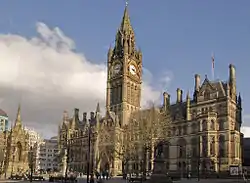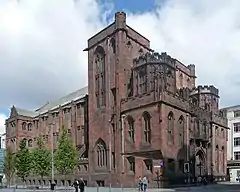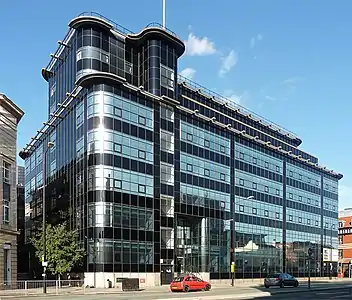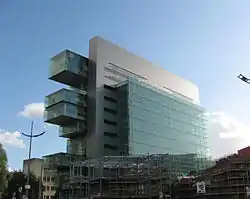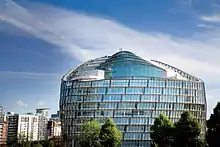Beetham Tower, Manchester
Beetham Tower (also known as the Hilton Tower)[11] is a landmark 47-storey mixed use skyscraper in Manchester, England. Completed in 2006, it is named after its developers, the Beetham Organisation, and was designed by SimpsonHaugh and Partners.[4] The development occupies a sliver of land at the top of Deansgate, hence its elongated plan, and was proposed in July 2003, with construction beginning a year later.
| Beetham Tower | |
|---|---|
Hilton Tower | |
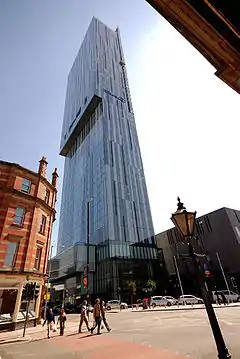 | |
| General information | |
| Status | Complete |
| Type | Hotel, residential, office[1] |
| Architectural style | High-tech / Neomodern |
| Location | 301–303 Deansgate, Manchester, England |
| Construction started | 2004 |
| Completed | 2006[2][3] |
| Cost | £150 million[4] |
| Owner | North West Ground Rents Limited, part of the publicly quoted Ground Rents Income Fund[5][6][7] |
| Height | |
| Antenna spire | To glass façade overrun: 169 m (554 ft)[3] |
| Roof | 158 m (518 ft) |
| Technical details | |
| Floor count | 47[8] |
| Floor area | 485,000 square feet (45,100 m2) |
| Lifts/elevators | 8[1] |
| Design and construction | |
| Architect | SimpsonHaugh and Partners[4] |
| Developer | Beetham Organization[4] |
| Structural engineer | WSP Group[9] |
| Main contractor | Carillion[4] |
| Awards and prizes | CTBUH Best Tall Building Award 2007 |
| References | |
| [1][10] | |
At a height of 554 feet (169 m), it was described by the Financial Times as "the UK's first proper skyscraper outside London".[12] From 2006 to 2018, the skyscraper was the tallest building in Manchester and outside London in the United Kingdom. In November 2018, it was surpassed by the newly topped out South Tower at Deansgate Square, which is 659 feet (201 m) tall.[13][14]
As a result of the elongated floor plan, the structure is one of the thinnest skyscrapers in the world with a height to width ratio of 10:1 on the east–west façade, but is noticeably wider on the north–south façade.[15][16] A four-metre cantilever marks the transition between hotel and residential use on the north façade, and a blade structure on the south side of the building acts as a façade overrun accentuating its slim form and doubles as a lightning rod. The skyscraper is visible from ten English counties on a clear day.
The top floor penthouse offers views of Greater Manchester, the Cheshire Plain, the Pennines and Snowdonia. The tower is known for emitting a loud unintentional hum or howl in windy weather, believed to emanate from the glass 'blade' atop the building.[17] The hum has been recorded as a B below middle C and can be heard over large parts of the local area.[18]
Architectural response to the skyscraper is polarised and interpretations vary. Some questioned its dominant appearance over the city, particularly over listed buildings, with one author going as far to say the skyscraper instantly "torpedoed" any possibility of Manchester becoming a UNESCO World Heritage City – a status Manchester was previously on the United Kingdom shortlist for due its industrial past.[19]
Others feel its dramatic appearance and peculiarity is reflective of Manchester, and that the Beetham Tower symbolises Manchester's reinvention as a post-industrial city, particularly since the bombing of 1996.[20][21] Nevertheless, it has received praise and was awarded the best tall building in the world in 2007 by the Council for Tall Buildings and Urban Habitat.[22] In 2019, it was the subject of a legal dispute over the need for urgent repair works to parts of the glass panel façade.[23]
History

The site was next to a redundant section of railway viaduct.[24] With the support of English Heritage and the recommendation of the planning department, the Beetham Organisation submitted a planning application to Manchester City Council in July 2003.[25] Planning permission was granted in October 2003.[1][26]
The skyscraper was part of Manchester's regeneration,[27] and by the end of 2003, before construction had started, 206 of its 219 flats, and 4 of its 16 penthouses had been pre sold.[28] The skyscraper was built when much of the United Kingdom was experiencing an economic boom and high rise towers were being built in many English cities.
Ground and foundation works commenced at the beginning of 2004, and construction started in April 2004.[29] By August 2004, work on its twin concrete cores had started and the structure was rising at a steady rate.
One of the cores reached 410 feet (120 m) at the end of July 2005, at which point the building became the tallest skyscraper in the United Kingdom outside London.[24]
The tower was "topped out" on 26 April 2006.[30] Local wind conditions dictated its height had to be reduced by about 6.6 feet (2.0 m) from the planned 561 feet (171 m).[3] The hotel opened on 9 October 2006, and the first apartment residents moved in during 2007. The skyscraper cost £150 million to construct.[4]
Architecture
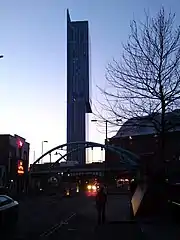
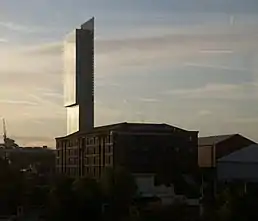
The building stands on a narrow site on Deansgate at the junction with Great Bridgewater Street and Liverpool Road. Its tall rectangular form maximises the available space. On the 23rd storey a cantilever projects by 13 feet (4 metres),[10] increasing its floor space and giving the tower definition. On the roof is a glass overrun, described as a "glass blade" by the architect. The ten-metre blade accentuates the flat south façade, contrasting with the north façade, and doubles as a lightning rod.[31]
The tower was built by Carillion[4] using post-tensioned flat slab concrete construction techniques[32] and was the first structure in the United Kingdom to use the Doka SKE 100 automatic climbing system and trapezoidal windshield.[33]
Piling foundations are typically preferred for skyscrapers; however, Manchester's sandstone substrata meant a raft foundation. The 2.5-metre thick raft foundation sits nine metres below the ground level.[34] Approximately 57,000 tonnes of concrete and 6,000 glass panes for the curtain-wall structure were required.[30] Over 8,000m2 of rigid insulation board by Kingspan was used to reduce heat loss.[35]

The curtain-wall structure is clad in glass, and elements were added to counter excessive light. Louvres on south-facing windows allow for the control of daylight and sunlight into its interior.[36] On the west- and east-facing sides, aluminium strips which are noticeable from ground level project outwards to provide shading from the sun.[36]
The louvres on the south façade alter its consistency and appearance when some are open and others are closed. They stop excessive passive solar gain. Ultraviolet light hits the glass and is changed to infrared which generates heat through radiation, creating overheating.
The tower has 47 floors and is 168.87 metres (554 ft) in height, making it the tallest building in the United Kingdom outside London, and the tallest building in Manchester, until it was surpassed by Deansgate Square.
Floors 1 to 22 are occupied by the 279-bedroom four-star Hilton Manchester Deansgate Hotel.[4] The 23rd floor has a four-metre cantilevered overhang with two glass windows in its floor, overlooking the ground from the skybar, Cloud 23. [37] The floor has a bar and lounge operated by Hilton.[11] Floors 25 to 47 are occupied by residential apartments.[38]
A twelve-storey office block is planned next to the tower,[4] with 6,506 square metres of floor space.[24] The hotel has a four-storey annexe, containing a swimming pool, ballroom, conference rooms and coffee shop.[37]
Occupancy
The architect, Ian Simpson, lived in the top floor penthouse, the highest residential space in Europe[39] after surpassing Lauderdale Tower at the Barbican Estate in London upon opening in 2006.[40] It cost £3 million and occupies the top two storeys.[11][37]
It has a semi indoor garden containing 21 four metre tall olive, lemon and oak trees, originating from Italy and lifted into place with cranes through a small aperture in the roof before it was glazed in 2006.
The Hilton Manchester Deansgate occupies space up to Level 22, and a four-metre cantilever marks level 23 where the Cloud 23 bar is located.[41] Above this level are apartments from level 25 to the triplex penthouse apartment on level 47.[3]
Beetham claimed 90% of the residences were sold before construction began in 2004.[42] The Daily Telegraph claimed that 55 of 219 apartments were waiting to be let, and a further thirty were unsold in September 2008.[43] In September 2010, the Manchester rental market had improved, and only two apartments out of 219 were unoccupied awaiting interior fit-out.
Prices for an apartment ranged from £200,000 to £750,000 in 2011.[44] In 2012 demand for apartments exceeded supply, causing bidding wars.[45] In 2017, the second highest penthouse on floors 44, 45 and 46 was put up for sale at £3,500,000.[46]
The tower has views over the set of Coronation Street from the north and west façade. The tower also has expansive vistas over Snowdonia, the South Pennines, the Peak District, the Cheshire Plain, Liverpool Cathedral[47] Blackpool Tower,[3] and Jodrell Bank Observatory on a clear day.[47]
Noise during high winds
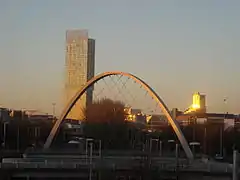
The building has become known for an intermittent hum, or howling, which is heard in windy weather, emanating from the roof's glass blade, and first reported in May 2006 – just weeks after the tower opened.[48] The skyscraper was intended to be 50 storeys high rather than 47, but wind load tests showed that it would sway too much because of its slender shape and the 'glass blade' façade overrun caused by the height reduction has been blamed for the noise.
The sound has been heard from about 300 metres away.[49] It is close to the standard musical pitch of B3 (approximately 246.94 hertz) and has been compared to a "UFO landing".[50] The noise affected production of Coronation Street.[51] Work to reduce or eradicate the noise took place in 2006, 2007 and 2010.[52] Foam pads were installed in 2006, aluminium nosing in 2007 and further work done in February 2010,[53] but attempts to eradicate the noise permanently have been unsuccessful.
The architect refused to alter the building after complaints of residents of Manchester. It was suggested that the decorative glass blade could be removed to solve the problem.[39] The humming noise occurred again during Storm Doris in February 2017[54] and during Storm Ciara in February 2020.
Incidents
On 11 September 2008, a pane of glass cracked, requiring the street below to be cordoned off. On 29 January 2009, a fire broke out on the 31st floor in Mario Balotelli's flat, and the tower was partially evacuated; one apartment was left uninhabitable.
On 14 February 2011, Beetham Hotels Manchester Ltd went into administration.[55] Later in the year, the hotel was sold to Cypriot businessman Loucas Louca.[56]
In popular culture
The Beetham Tower featured in television programmes Vertical City (2007) for More 4, Britain From Above for BBC One (2008) and Time Travel (2010) for the National Geographic Channel.[57][58] It is depicted in the opening titles of numerous television programmes – including The Street, Coronation Street, and the Manchester sequence of ITV Sport's England football coverage.
Scenes for Series 2 of Scott & Bailey were filmed in the reception area of the hotel, although the scenes were set in Bristol. AMC Cinemas can be seen in the outdoor shots.
American band Paramore used an audio sample from a video of the tower howling, throughout the track "Idle Worship" on their 2017 album After Laughter. In an interview with Zane Lowe for Beats 1, guitarist Taylor York admitted to finding out about Beetham Tower online and then went on to sample it in the song.
See also
- No. 1 Deansgate, another glass residential building on the same road, also designed by Simpson Haugh
- Habitat Sky, a similar skyscraper in Barcelona
References
- "Beetham Tower". Emporis. Retrieved 14 December 2011.
- "Work starts on luxury high rise". BBC News. 28 April 2004. Retrieved 23 February 2008.
- "City building reaches full height". BBC News. 26 April 2006. Archived from the original on 24 December 2007. Retrieved 23 February 2008.
- "Beetham Tower Manchester". SkyScraperNews. 14 February 2008. Archived from the original on 22 February 2008. Retrieved 23 February 2008.
- "Iconic Beetham Tower needs a £4m makeover after court found it in 'disrepair' with serious fault affecting 1,350 glass panels". Manchester Evening News. 15 February 2019. Retrieved 21 May 2020.
- "Beetham Tower applies for cladding fix to window woes". Place North West. 14 April 2020. Retrieved 21 May 2020.
- "John Christodoulou side-steps £4m 'dou-dou' at Beetham Tower, where leaseholders face bills of £40,000 each as the works begin". Leasehold Knowledge Partnership. 21 April 2020. Retrieved 21 May 2020.
- "Engineering Timelines – Beetham Tower". Engineering Timeline. Retrieved 6 January 2012.
- "WSP UK: Beetham Hilton Tower, Manchester". Retrieved 6 January 2012.
- "Beetham Tower". skyscrapercity.com. 27 April 2010. Retrieved 14 December 2011.
- "Information about the Beetham Tower Manchester". Archived from the original on 27 October 2008. Retrieved 13 October 2008.
- John Sunyer (22 March 2013). "View from the top: At home (in Manchester) with Ian Simpson, one of the architects transforming the face of London". Financial Times. London. Retrieved 26 November 2014.
Though for Manchester, it's massive. Nothing comes close on this skyline. People stop and stare. Look, there it is, the UK's first proper skyscraper outside London.
- "Manchester's tallest skyscraper plan approved". BBC News. 30 June 2016. Retrieved 24 July 2016.
- "The Beetham Tower isn't the tallest building in Manchester anymore". Manchester Evening News. 12 June 2018. Retrieved 13 June 2018.
- "How We Built Britain". BBC. 18 September 2007.
- "Video interview with Ian Simpson about the Hilton Tower". Beetham Tower. Retrieved 14 December 2011.
- "70mph winds, driving rain, delays on the M60 and Beetham Tower howling: Welcome back to work". Manchester Evening News. 3 January 2012. Retrieved 3 January 2012.
- "Beetham Tower howls again after another windy night in Manchester". Manchester Evening News. Retrieved 5 January 2012.
- Punter, John (2010). Urban Design and the British Urban Renaissance. London: Routledge. p. 59. ISBN 9780203869208.
- "Architecture and people: review of the decade". Manchester Confidential. 22 December 2009. Archived from the original on 7 June 2012. Retrieved 18 February 2012.
The jury may be out on Beetham Tower and Chips but this writer admires their verve
- "Beetham Tower Manchester Celebrates Top Out". Skyscraper News. 27 April 2006. Retrieved 18 February 2012.
However, it has been criticised by some for its 'boxy' minimalist design. The aesthetic appeal may be debatable but the structural significance is not
- "2007 Best Tall Building – The Beetham Hilton Tower". Council for Tall Buildings and Urban Habitat. Archived from the original on 29 August 2018. Retrieved 1 March 2013.
- "Beetham Tower 'in disrepair'". Place North West. February 2019.
- "Beetham Reaches New Heights in Manchester". SkyScraper News. 1 August 2005. Retrieved 23 February 2008.
- "First Skyscraper Proposed For Manchester". skyscrapernews.com. 21 July 2003. Retrieved 11 April 2012.
- "Beetham Manchester Approved". skyscrapernews.com. 28 October 2008. Retrieved 11 April 2012.
- "High hopes for 'prestigious' flats". BBC News. 23 July 2003. Retrieved 15 December 2011.
- "Green light for high living". BBC News. 27 October 2003. Retrieved 23 February 2008.
- "Work starts on luxury high rise". BBC News. 28 April 2004. Retrieved 15 December 2011.
- "Beetham Tower lights up the sky". Manchester Evening News. 27 April 2006. Retrieved 15 December 2011.
- "Lightning strikes Beetham Tower". BBC News. 31 July 2009. Retrieved 11 April 2012.
- "A Guide to Civil Engineering in Manchester". Archived from the original on 14 February 2008. Retrieved 25 March 2008.
- Seers, Richard (October 2005). "Keeping Beetham Tower on target". Concrete. Retrieved 26 March 2008.
- "Beetham Hilton Tower Manchester" (PDF). Archived from the original (PDF) on 3 March 2016. Retrieved 26 January 2013.
- "Beetham Tower – Manchester". Kingspan Insulation. Retrieved 11 April 2012.
- "Beetham Tower, Manchester brochure" (PDF). beetham.eu. Archived from the original (PDF) on 21 April 2012. Retrieved 15 December 2011.
- "Beetham Tower Manchester Celebrates Top Out". SkyScraper News. 27 April 2006. Retrieved 23 February 2008.
- "Information about the Hilton Hotel in the Beetham Tower". Archived from the original on 27 October 2008. Retrieved 13 October 2008.
- Sargent, George (6 January 2012). "I'm sorry about the Beetham Tower howl, says architect Ian Simpson". Manchester Evening News. Retrieved 6 January 2012.
- Ward, David (2 November 2012). "Manchester tower to top Barbican". The Guardian. Retrieved 2 November 2012.
- CLOUD 23. "Cloud 23 | Manchester's Top Champagne & Cocktail Bar". Cloud23bar.com. Retrieved 22 January 2016.
- "301 Deansgate Manchester". Beetham Organization. Archived from the original on 12 February 2012. Retrieved 11 April 2012.
- Jamieson, Alastair (27 September 2008). "Britain suffering from a buy-to-let blowout". The Daily Telegraph. London.
- Binns, Simon (20 December 2011). "Apartment Prices: The Ups And Downs". Manchester Confidential. Archived from the original on 14 January 2013. Retrieved 6 January 2012.
- Linton, Deborah (20 February 2012). "Rental boom triggers bidding wars for Manchester city centre flats". Manchester Evening News. Archived from the original on 24 April 2012. Retrieved 3 April 2012.
- "Check out this property for sale on Rightmove!". Rightmove.co.uk. 2017.
- "Landmarks to see from the Beetham Tower in Manchester". 23 October 2008. Archived from the original on 27 October 2008. Retrieved 23 October 2008.
- Wainwright, Martin (8 May 2006). "Engineers to investigate 'whistling' tower". The Guardian. London. Retrieved 2 November 2012.
- "Video: Roof blown off Oldham rugby union clubhouse as gales batter Greater Manchester". Manchester Evening News. 8 December 2011. Retrieved 14 December 2011.
- "Buildings that whistle in the wind". New Scientist. London. 4 August 2006.
- "Tower blows the whistle on Corrie". Manchester Evening News. 24 May 2006. Retrieved 14 December 2011.
- McKeegan, Alice (11 February 2010). "Repairs to silence 'whistling' Beetham Tower". Manchester Evening News. Retrieved 14 December 2011.
- "70mph winds, driving rain, delays on the M60 and Beetham Tower howling: Welcome back to work". Manchester Evening News. 3 January 2012. Archived from the original on 10 January 2012.
- "What's that humming noise in the city centre? The Beetham Tower whistling of course". Manchester Evening News. 23 February 2016.
- Barns, Kat (18 February 2011). "Administrators called in at Beetham's Manchester and Liverpool hotel firms". my-hospitality.com.
- Harmer, Janet. "Tags: Two Beetham Group hotels are sold". Caterer and Hotelkeeper. Archived from the original on 25 November 2011. Retrieved 28 November 2011.
- "Beetham Tower on Vertical City, Channel 4". beethamtower.org. 21 February 2009. Retrieved 12 December 2011.
- "New Manchester". BBC. Retrieved 14 December 2011.
External links
| Wikimedia Commons has media related to Beetham Tower, Manchester. |
| Records | ||
|---|---|---|
| Preceded by CIS Tower |
Tallest Building in Manchester 2006—2018 169m |
Succeeded by South Tower Deansgate Square |
| Preceded by CIS Tower |
Tallest Building outside London, UK 2006—2018 169m |
Succeeded by South Tower Deansgate Square |
